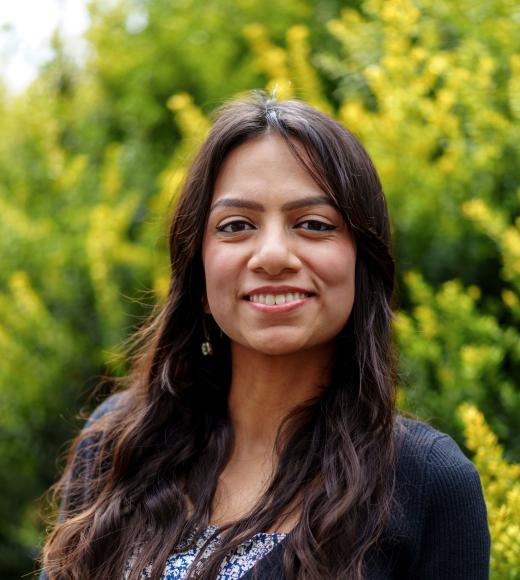International Women’s Day Spotlight on Fizza Usmani

In honor of International Women’s Day on March 8, the University of California, Davis, College of Engineering recognizes women in engineering, their journey to and in the field, and how they promote a diverse, equitable and inclusive world.
Meet Fizza Usmani, a Ph.D. student in the Department of Chemical Engineering, and learn how she inspires inclusion in engineering.
What inspired you to pursue engineering? Describe your journey to UC Davis.
I pursued engineering because of my mom. I always loved science, but was intimidated by the field of engineering and did not think I could do it. But my mom encouraged me and made me believe that I would be able to take on this challenge. I am eternally grateful to her because I love what I do and I wouldn’t be here if she hadn’t encouraged me and pushed me.
I did not do a lot of research during my undergrad, but during my master's degree, I realized how much I loved doing research and that I wanted to continue working in this aspect of engineering. But the areas of research I wanted to work in were not available where I was. So I decided to pursue a Ph.D. in the United States, where the research within chemical engineering is very diverse. I chose UC Davis because our department is very well-balanced in terms of focus areas, and we have numerous professors working on engineering problems for biological applications, which is what I wanted to explore.
Describe your current research and its impact.
My research focuses on fluid dynamics within membranes, where I'm developing a framework that can be used to predict and control the movement of small molecules within the cell membranes in our body. My work is very fundamental, and the goal is to apply it to targeted drug delivery applications.
The 2024 International Women’s Day theme is #InspireInclusion. Why is it important to "inspire inclusion" in the engineering field?
As a female engineer, I am often one of the few women in the room and have often felt that I needed to prove my intellect and prove that I deserved to be where I am, whereas my male colleagues have always been afforded the benefit of the doubt. It is also not lost to me that even the most well-meaning progressive men I know do not and will not ever fully understand the struggles we face. It is important to have women in the field because we recognize this problem. The more women we have in the field, the more we can rise up and eliminate these baseless biases on a systematic level.
Additionally, in my eyes, engineering is just several people solving small problems to come up with a larger solution (or a product), and everyone brings their own unique perspectives to the table. We cannot do justice to this task if we ignore and keep out one-half of the world's population, not on the basis of merit but on the basis of gender.
What people or programs have inspired inclusion throughout your journey in engineering?
My friends from undergrad are front and center in inspiring inclusion for me. They broke through in a very male-dominated field, and have continued to excel beyond all expectations. Also, in my first year here, I had a very honest talk with our department chair Dr. Tonya Kuhl about the prejudice women face. She shared with me some of her own experiences, and told me how we always need to own the space we’re in and not let anyone tell us any different. Quite simple, yes, but it meant a lot to me coming from someone as accomplished as her, knowing she had faced the same prejudices but rose above. I will always carry that conversation with me.
I would be remiss if I did not mention my PI - Dr. Hari has been an excellent mentor. He understands that the biases I face might not just be limited to my gender, but the color of my skin as well. He has helped me navigate these biases, and makes sure I know that I am supported and protected.
How do you make others feel welcome in engineering and promote diversity and equity in the field?
I think leading by example is the best approach. I come from a very humble background, where pursuing grad school is not something women do, much less pursuing a Ph.D. Simply being here today shows other women like me back home that they can do this, too. It is not unattainable or an impossible goal. Too often, we are told the opposite by older, narrow-minded people. My being here proves that notion wrong.
I have also been the TA for several classes now, where female students have approached me about my work and grad school in general. I make sure I continue to do for them what my mother did for me - encourage them and make sure they know they can achieve whatever it is that they want. They are all bright, smart women, and being where I am, I believe it is my responsibility to help them achieve their goals in any way that I can.
Personally, I would like to make sure that path for any girl that comes after me is easier than it was for me.
